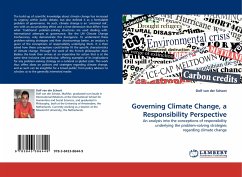
Governing Climate Change, a Responsibility Perspective
An analysis into the conceptions of responsibility underlying the problem-solving strategies regarding climate change
Versandkostenfrei!
Versandfertig in 6-10 Tagen
32,99 €
inkl. MwSt.

PAYBACK Punkte
16 °P sammeln!
The build-up of scientific knowledge about climate change has increased its urgency within public debate, but also defined it as a formidable problem of governance. As such, climate change is an 'untamed risk', one with an accumulating effect and a time-dimension that differs from what 'traditional' problem-solving structures are used dealing with. International attempts at governance, like the UN Climate Change Conferences, only demonstrate this divergence. To understand these problem-solving strategies and their shortcomings better, an analysis is given of the conceptions of responsibility u...
The build-up of scientific knowledge about climate change has increased its urgency within public debate, but also defined it as a formidable problem of governance. As such, climate change is an 'untamed risk', one with an accumulating effect and a time-dimension that differs from what 'traditional' problem-solving structures are used dealing with. International attempts at governance, like the UN Climate Change Conferences, only demonstrate this divergence. To understand these problem-solving strategies and their shortcomings better, an analysis is given of the conceptions of responsibility underlying them. It is then asked how these conceptions could better fit the specific characteristics of climate change. Through the work of the French philosopher Alain Badiou the book then arrives at an imperative for action that is at the same time inclusive and particular, offering examples of its implications for any problem-solving strategy on a national or global scale. This work thus offers ideas on policies and strategies regarding climate change, and as such can be insightful for a broad public; from policy advisors to scholars as to the generally interested reader.












